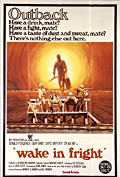
Directed by
Ted Kotcheff
114 minutes
Rated MA
Reviewed by
Bernard Hemingway


Wake In Fright
Synopsis: Outback schoolteacher, John Grant (Gary Bond), is heading back to Sydney for the holidays when along the way he gets involved in a game of two-up and loses all his money. That is just the beginning of his troubles as he is about to experience the dark heart of White Australia.
Wake In Fright was the first feature film for Canadian-born television director Ted Kotcheff who was yet to direct the well-regarded Nick Nolte sports movie North Dallas Forty (1979) and reach the commercial apogee of his film career with Sly Stone’s First Blood (1982) before slowly, via the cult black comedy Weekend At Bernie’s (1989), disappearing into the small screen. Unquestionably his best work, it is a remarkable film that with Nic Roeg’s Walkabout (1971) which was released the following year, is often discussed in the context of its grasp of the spiritual estrangement of White Australia, an insight that no home-grown director has been ever been able to capture so well. The film has a Conradian sense of colonialist alienation and fatalistic despair that makes a comparable effort such as Ken Hannam’s Sunday Too Far Away (1975) appear decoratively romantic in comparison.
How Kotcheff pulled this off is a question that deserves answering, at least in part. There are a number of readily apparent answers. Kenneth Cook’s novella of the same name is simple, direct and well-structured and the film's faithful adaptation realizes these qualities brilliantly. Kotcheff and English cinematographer Brian West create John Grant’s descent to hell with unerring fidelity. From the opening frame with its almost Sergio Leone-like 360 degree sweep of dust-bowl desolation, to the two-up game, to the kangaroo hunt and its aftermath, the rawness and directness of the images make you feel as if you are there in person. Rarely does a film achieve such immediacy in transporting an audience into its universe.
Outstanding too are the cast. Gary Bond, a Peter O’Toole look-alike and, like Kotcheff, someone who emerged from television for a time in feature films before returning to it, is quite well-suited as the nice young man completely out-of-depth but it is the rest of the performances which sustain his blandness. From John Meillon’s grubby bar-keep to Chips Rafferty’s hard-drinking paternalistic town cop (his final appearance on screen and a fitting tribute to his long career as an iconic Aussie) to Donald Pleasence’s alcoholic nihilist, to name just a few, the characters of Cook’s work are brought to life with vivid credibility. No doubt the face of Australia has changed considerably since the film was made, and one hopes it is no longer so crude, but as a portrait of a time and place Wake In Fright is stunning, as a drama it remains powerful.
Well, for the most part. If the Conradian sense of “the horror” of cultural and spiritual desolation and isolation and its displacement by alcohol-fueled, homo-erotic mateship (the film is slightly coy with respect to the second aspect which does not surface in the novel) is gradually made apparent through the narrative, the film’s denouement rather glibly salvages us from it. Whereas Cook’s text has Grant redeemed and morally tempered by his experiences, the film simply and far too neatly restores him to his senses. Had Kotcheff and writer Evan Jones (whose other credits include The Killing Of Angel Street, 1981) got this right it would have been a small masterpiece in anyone's language. As it is, it’s a damn fine film and an absolute classic of Australian cinema.
FYI: It is somewhat ironic that NLT, the production company formed by Bill Harmon and Don Cash, went broke with this but the pair bounced back with the hugely successful TV soapie, Number 96.
Show detailed review
Want something different?





